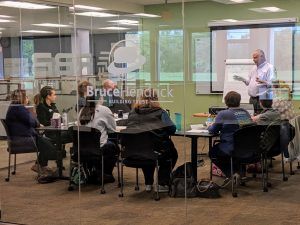Get in touch
555-555-5555
mymail@mailservice.com
I Don’t Know…Can You Help Me?
 As adults these are some of the toughest words to say. Not being a psychologist or philosopher I cannot tell you why. I only know how rare, useful, and liberating this acknowledgement can be. In the realm of trust building
, facing uncertainty and weakness can do much to accelerate and catalyze interpersonal relationships as well.
As adults these are some of the toughest words to say. Not being a psychologist or philosopher I cannot tell you why. I only know how rare, useful, and liberating this acknowledgement can be. In the realm of trust building
, facing uncertainty and weakness can do much to accelerate and catalyze interpersonal relationships as well.
It seems that the older we get, the more responsibility we have, or the more that others rely on us, the less apt we can be to admit our lack of understanding or need for skill-building. We don’t want to feel vulnerable. We hate to confess that what we are doing, no matter how well intentioned, just isn’t working.
Plus, many of us get paid for what we know. We’re just “supposed to know” certain things that come with the job, the territory, or the title… or so we tell ourselves. We buy into the lie that says I must prove myself worthy of that paycheck instead of the truth that no one person can know everything there is to know. So we keep stubbornly attempting unsuccessful approaches.
Oh how I wish this was not so familiar.
Why must we exhaust ourselves like this? Because of the great feeling we get from accomplishing things on our own? I’d guess not, since the emotion is so fleeting. Nope; it’s because asking for help is so hard. In the world of mental health and addiction, there is good reason that the final point of fatigue and surrender is often called “hitting bottom.”
Let’s see if we can raise that bottom so that we can feel better sooner, get the help we need, and build some trust with others along the way.
Say Uncle!
Human beings can take a lot. A lot of inconvenience, pain, suffering, struggle, and hardship. We are amazingly resilient folks. If coping with adverse conditions earned us medals, most of us would be Olympians.
 But in life, and certainly in most work situations, results
are what matters. We don’t earn points for the struggle. Forgive me but it bears repeating: we do not earn points for how hard something is to achieve – we earn them when we achieve our goal in the fastest, easiest way possible. So I’d like to share a simple and powerful way to break through any pattern of ongoing struggle.
But in life, and certainly in most work situations, results
are what matters. We don’t earn points for the struggle. Forgive me but it bears repeating: we do not earn points for how hard something is to achieve – we earn them when we achieve our goal in the fastest, easiest way possible. So I’d like to share a simple and powerful way to break through any pattern of ongoing struggle.
As kids my brother Ron used to twist my arm behind my back until I yelled “uncle.” Pain increased so sharply I had no choice but to submit. It was, I remember, distinctly effective.
These days I just ask myself, “What do I need to say ‘uncle’ to right now?” In other words, what pain or struggle can I relieve immediately by admitting that something is bigger than me , at least for the moment? If I’m honest with myself usually an answer (or two) will come to me right away.
Then I say it out loud: “Uncle!” This helps me to find the courage, strength or wisdom to admit my frustrating struggles and begin to ask for help. With time and repetitive practice, it has even led to asking for the help before I accumulate the stress in the first place.
As an example I recently had to face an annoyingly stubborn performance issue in my RBB business. I felt I had done everything right to manage our way through it but one key number just never improved. Finally I closed the door, yelled Uncle! to myself, and admitted I did not know what to do next. I got on the phone with a couple of trusted advisors and before the day was out we had a fresh plan of attack. Simple… but so hard!
On the personal side, not being very handy, I asked for help in the insulation and drywall of my new barn office from my friends at church. We had a blast and the result was much better than I could have done on my own.
 my barn office – thanks to getting the help I needed!
my barn office – thanks to getting the help I needed!
Pain Tolerance Reduction
Assuming that you are willing to concede your pain-endurance medal to others, the trick is to ask for help sooner by reducing your tolerance for pain. You can choose to alleviate discomfort and shift your “bottom” so it is not so far down!
 If your brother didn’t pick on you, maybe “Uncle!” isn’t it… but find a simple trigger that works for you. Maybe it’s a stress ball on your desk: as you squeeze it, identify the suffering are you living with that moment. Or perhaps it’s one of those “easy” buttons that reminds you to find an easier way.
If your brother didn’t pick on you, maybe “Uncle!” isn’t it… but find a simple trigger that works for you. Maybe it’s a stress ball on your desk: as you squeeze it, identify the suffering are you living with that moment. Or perhaps it’s one of those “easy” buttons that reminds you to find an easier way.
Finally, by asking those around you for help you let your guard down and become more approachable. This opens up all kinds of opportunities to build mutual reliance and trust. It also sets a great example for others – so that maybe you can help raise the bottom for a lot of people along the way!
Need help letting your guard down? ODS can help teach the skills to improve relationships, both business and personal, while providing insight into interpersonal communication as a process that can be continually improved. Contact me today about finding out more.
Author’s Note: If childhood shenanigans and stories of that genre interest you, you might enjoy “Jimmy” – a brief chapter of my soon-to-be-published book, Recollections Of An Unlikely CEO.
Bruce loves to help people overcome challenges, particularly in leadership, interpersonal relationships and trust. He’s a noted speaker, author, active church member and community volunteer. Bruce’s day job has been to lead RBB since 2001, becoming Owner in 2007.
Bruce is blessed to share his life with his wife Donna and their three wonderful children: daughters Kelly and Kara, and son Kirk. As time permits he enjoys golf, writing and learning how to live in the country.

Bruce Hendrick founded Building Trust in 2008 to help clients feel less isolated in their careers and lives, allowing them to cut through the distractions, build on unique talents, forge stronger relationships, and work more effectively with less stress.
Services
All Rights Reserved | Building Trust, LLC. All Rights Reserved



